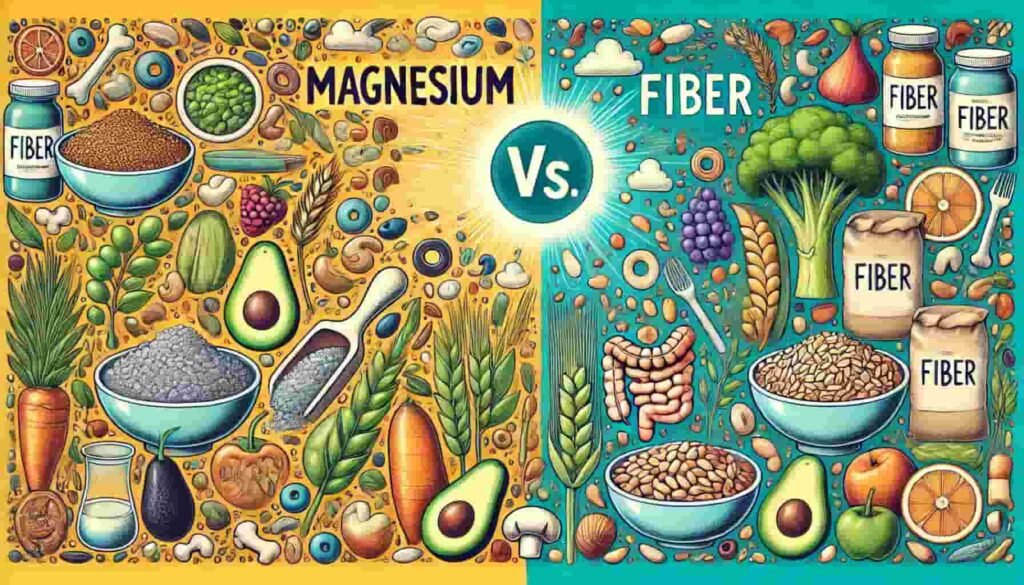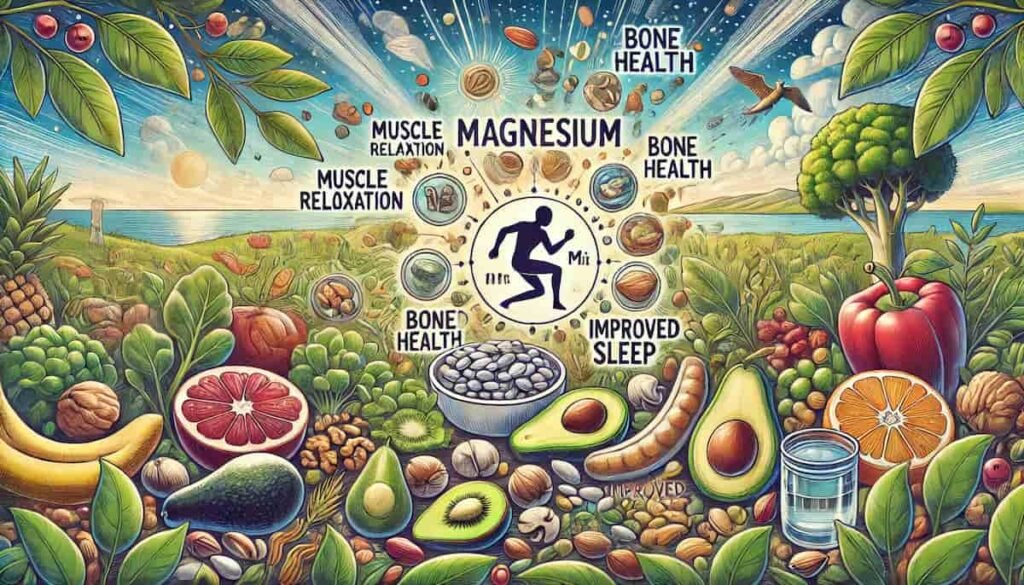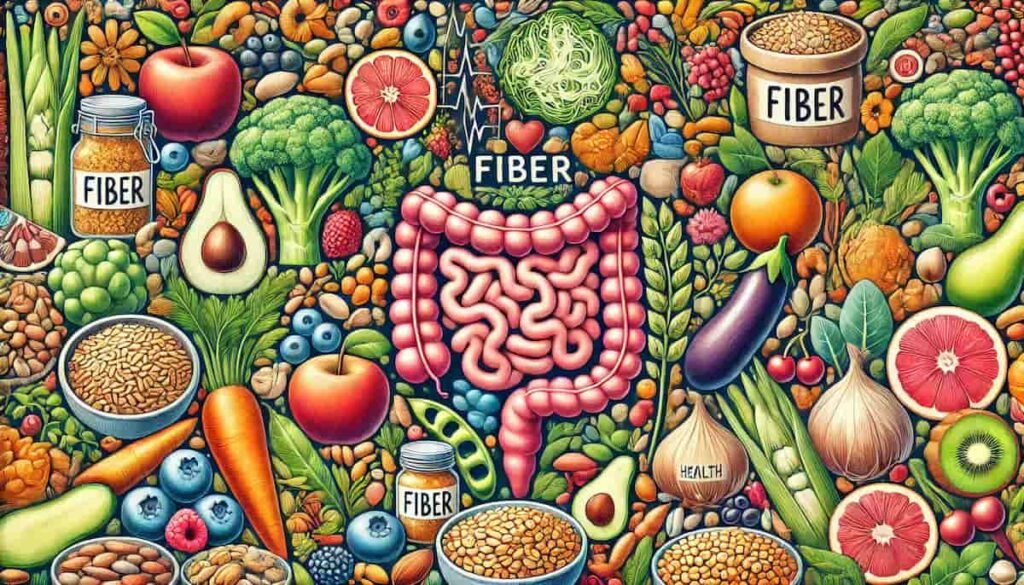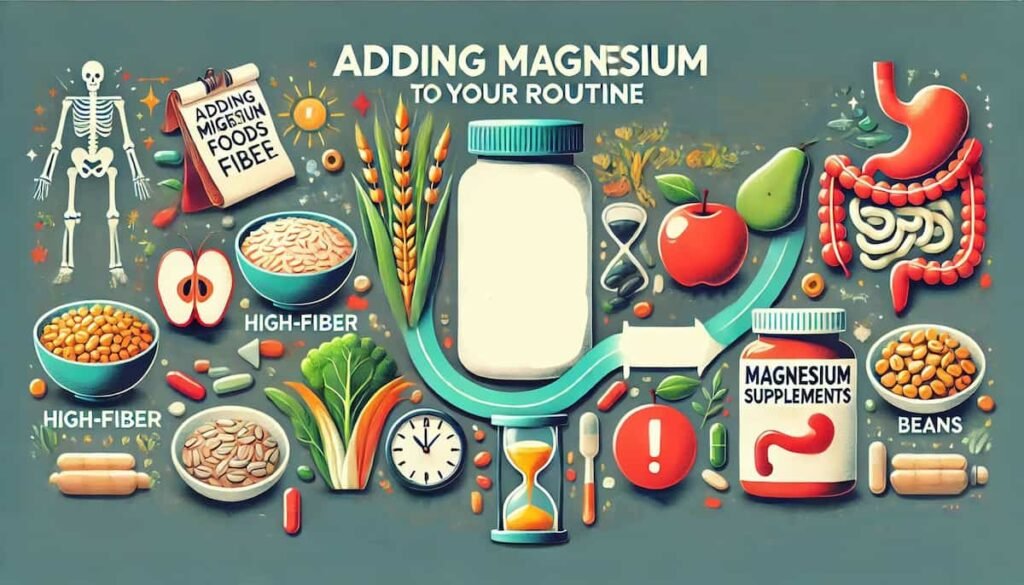Let’s be real—everyone’s been there. You sit down, and, well, nothing happens. Constipation can be frustrating, uncomfortable, and sometimes downright painful. When you’re feeling backed up, two big players in the “poop game” are often recommended: magnesium vs. fiber.
But which one is better for getting things moving smoothly? In this post, we’ll dive into the benefits of magnesium and fiber, how they work, and which one might be the best choice for you when you need a little nudge.
Why Do Magnesium and Fiber Help with Constipation?
First off, let’s get a basic understanding of why magnesium and fiber are commonly used for bowel health. They both help in different ways, and understanding their roles might just help you find the right solution for that pesky constipation.

Magnesium
Magnesium works by drawing water into the intestines. This process is called an osmotic effect, which softens the stool and makes it easier to pass. It’s particularly effective for people who struggle with occasional constipation and want a quick fix.

Magnesium citrate is often recommended as a natural laxative, and it works relatively quickly—sometimes even a little too quickly if you’re not careful!
Fiber
Fiber, on the other hand, adds bulk to your stool, which helps stimulate your intestines to move things along. There are two types of fiber: soluble and insoluble.

Soluble fiber absorbs water, making your stool softer, while insoluble fiber adds bulk and speeds up the transit time in your digestive system. Both types are helpful in different ways, and you’ll find fiber in foods like whole grains, fruits, and vegetables.
The Benefits of Magnesium for Constipation
Magnesium has a unique way of easing constipation that can make it an effective choice for many people.

Quick Relief
If you’re in a bind (no pun intended) and need fast relief, magnesium might be your best option. Magnesium citrate and magnesium hydroxide are known for their ability to provide results within hours.
Easy to Take
Magnesium is available in a variety of forms: pills, powders, or even as part of mineral waters. This makes it easy to adjust the dose depending on your needs. Many people find that magnesium supplements can also help them sleep better at night, adding an extra benefit to its use.
Gentle Osmotic Action
Magnesium pulls water into the intestines, which helps soften the stool and makes it easier to pass. Unlike some stimulant laxatives, which can be harsh and lead to cramping, magnesium tends to be gentler on the system.
Potential Drawbacks of Magnesium
- Risk of Diarrhea: Taking too much magnesium can quickly lead to diarrhea, which, let’s be honest, is not what you want. It’s all about finding the right balance.
- Electrolyte Imbalance: Long-term use of magnesium as a laxative can potentially lead to an imbalance in electrolytes. It’s best to use it for occasional relief rather than an everyday solution.
The Benefits of Fiber for Constipation
When it comes to natural, sustainable relief for constipation, fiber is a superstar.

Long-Term Solution
Unlike magnesium, which is best for short-term relief, fiber is all about keeping you regular in the long term. Adding high-fiber foods like fruits, vegetables, and whole grains to your diet ensures your bowel movements stay consistent and soft.
Supports Overall Gut Health
Fiber does more than just help with pooping; it feeds the good bacteria in your gut. These bacteria are crucial for your digestive health, immunity, and even mood regulation. Fiber, especially from diverse food sources, helps build a healthy gut microbiome.
Bulks Up Stool
Fiber absorbs water and bulks up the stool, which helps trigger the digestive system to push things through. Insoluble fiber, in particular, acts like a broom, sweeping through your intestines and making sure things move along at a steady pace.
Potential Drawbacks of Fiber
- Takes Time: Increasing your fiber intake doesn’t give immediate results. You may need a few days (or even weeks) to notice a significant difference.
- Gas and Bloating: When you suddenly increase your fiber, you might experience some unwanted gas and bloating. Gradually increasing your fiber intake can help minimize these side effects.
Magnesium vs. Fiber: Which Is Right for You?
So, which one should you pick—magnesium or fiber? It really depends on what you need.
If You Need Quick Relief
Magnesium is your best bet if you need something that works quickly and effectively. It can be especially helpful for those moments when you’re traveling, dealing with medication-induced constipation, or just have a stubborn situation that needs immediate attention.
If You Want Long-Term Regularity
Fiber is the way to go if you’re looking for a sustainable, long-term solution to keeping your digestive system happy. It’s not a quick fix, but adding more fiber to your daily diet can help prevent constipation from happening in the first place.
Magnesium vs. Fiber: A Quick Comparison
| Category | Magnesium | Fiber |
|---|---|---|
| Speed of Relief | Fast (within hours) | Slower (days to weeks) |
| Best For | Occasional constipation | Long-term digestive health |
| How It Works | Draws water into intestines | Adds bulk and retains water |
| Potential Issues | Can cause diarrhea | Can cause gas and bloating |
| Form | Supplements | Whole foods, supplements |
Adding Magnesium and Fiber to Your Routine
For most people, a combination of magnesium and fiber works well. Here’s how you can add both in a balanced way:

Eat More High-Fiber Foods
The easiest way to add fiber is through your diet. Foods like oats, apples, beans, and leafy greens are packed with fiber. Start slow and gradually increase the amount you’re eating to give your body time to adjust.
Use Magnesium as Needed
Magnesium supplements can be a great backup for those days when you need a little extra help. You can find magnesium citrate at most drugstores. Just be sure not to overdo it, as too much can lead to an upset stomach.
FAQs About Magnesium and Fiber for Constipation
Can you take magnesium and fiber together?
Yes, you can. In fact, taking magnesium along with increasing fiber in your diet can provide both quick relief and long-term benefits for gut health.
Which magnesium is best for constipation?
Magnesium citrate and magnesium hydroxide are commonly used for constipation. They draw water into the intestines effectively and usually provide results within a few hours.
How much fiber should I aim for daily?
The general recommendation is 25-30 grams of fiber per day, depending on your age and gender. Make sure to drink plenty of water along with fiber to help it do its job.
Can magnesium cause dependency for bowel movements?
Using magnesium occasionally is safe for most people, but relying on it for daily bowel movements might lead to dependency. It’s better to use it as a short-term aid rather than a long-term solution.
Will fiber help immediately with constipation?
No, fiber generally takes a bit longer to work. If you’re adding more fiber to your diet, you should see improvement in your bowel movements within a few days to a week.
Is fiber always better than magnesium for constipation?
It depends on your needs. Fiber is better for long-term digestive health, but magnesium can be more effective if you’re looking for immediate relief.
When it comes to magnesium vs. fiber for helping you poop, there’s no one-size-fits-all answer. If you need fast relief, magnesium will get things moving, while fiber is the hero of long-term digestive health.
It’s a good idea to keep both in your toolbox, using magnesium when you need it and steadily increasing fiber to keep your gut happy and regular. And remember, stay hydrated! Water is your secret weapon in both cases.
References
- https://ods.od.nih.gov/factsheets/Magnesium-HealthProfessional/#:~:text=Magnesium%20is%20a%20cofactor%20in,%2C%20oxidative%20phosphorylation%2C%20and%20glycolysis.
- https://www.mayoclinic.org/healthy-lifestyle/nutrition-and-healthy-eating/in-depth/fiber/art-20043983#:~:text=Dietary%20fiber%2C%20also%20known%20as,t%20digested%20by%20your%20body.